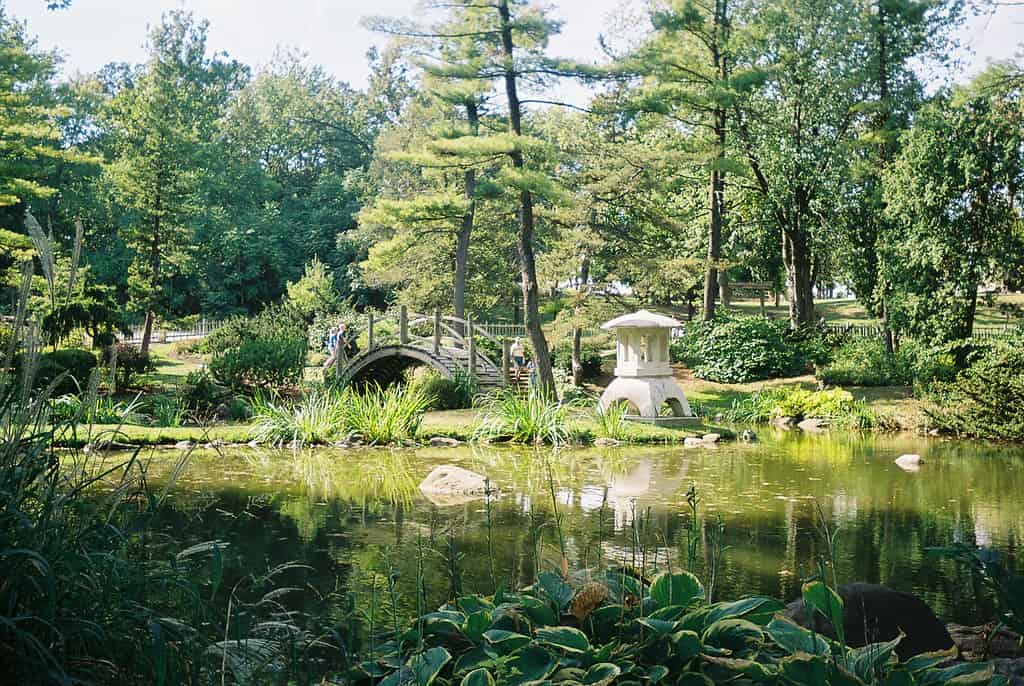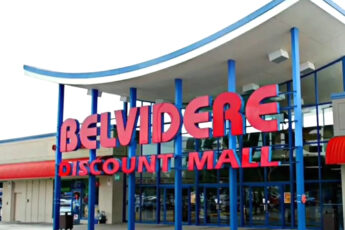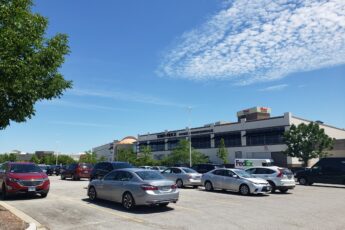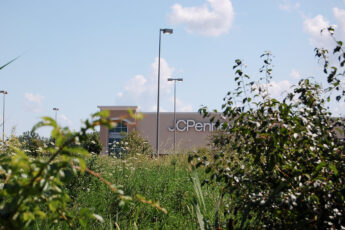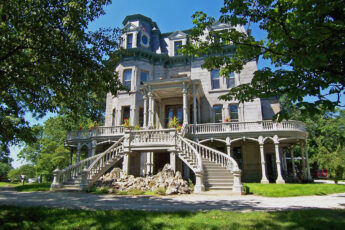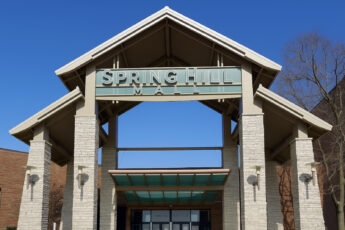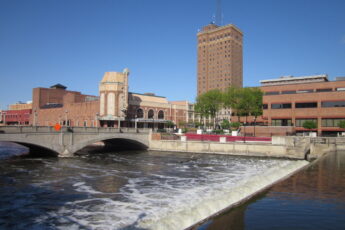Geneva, Illinois, is a charming city nestled along the Fox River. It is known for its scenic beauty, rich history, and vibrant community. It boasts a picturesque downtown area with unique shops, delightful restaurants, and well-preserved historic buildings that glimpse the city's past.
Visitors can explore the numerous parks and trails, such as the Fox River Trail, which provides ample opportunities for outdoor activities like biking, walking, and kayaking.
The city's cultural heritage is celebrated through various museums and historical sites, including the Geneva History Museum, Fabyan Villa Museum & Japanese Garden, and the Durant House Museum. These attractions provide insights into the local history and architecture, making Geneva a perfect destination for history enthusiasts.
Geneva also hosts various events throughout the year, from the famous Swedish Days Festival to art fairs and seasonal celebrations, adding to the city's lively atmosphere.
Whether you're looking for a peaceful retreat or an engaging cultural experience, Geneva, IL, welcomes you with open arms and promises a memorable visit.
Geneva, IL, offers various activities catering to different interests. Here are some highlights:
Best Things to Do in Geneva, IL
- Fabyan Villa Museum & Japanese Garden: Explore the history and architecture of the Fabyan estate, redesigned by Frank Lloyd Wright, and enjoy the serene Japanese garden.
- Downtown Geneva: Stroll through the charming downtown area, which boasts Victorian architecture and unique shops and restaurants.
- Fox River Trail: For outdoor enthusiasts, the Fox River Trail provides scenic views and a path for biking and walking.
- Island Park: A lovely spot for a walk or to let children play on the playground.
- Peck Farm Park: Offers hiking trails, a nature playground, a butterfly house, and a lake.
- Geneva History Museum: Delve into Geneva's rich past with interactive exhibits and artifacts that tell the story of the city's development and community life.
- Durant House Museum: Step back in time at this well-preserved 1840s pioneer home, offering a glimpse into the domestic life of early American settlers.
- Good Templar Park: Discover a tranquil retreat featuring open spaces for picnics, historic Scandinavian buildings, and cultural events celebrating Geneva's heritage.
- Fox River Trolley Museum: A journey into the history of transportation.
- Cantigny Park: A sprawling park with beautiful gardens and historical exhibits.
These are just a few options; there's much more to discover in Geneva, IL. Enjoy your visit! 😊
Fabyan Villa Museum & Japanese Garden
The Fabyan Villa Museum is a historic site that encapsulates the legacy of George and Nelle Fabyan. In 1905, the couple acquired the mid-1800s farmhouse and transformed it into a grand estate named Riverbank.
In 1907, Frank Lloyd Wright was commissioned to redesign the farmhouse. He added a south wing, verandas, and large eaves, creating a cruciform Prairie-style country house.
The Fabyans were eclectic collectors, and their home became a repository for their diverse interests.
Today's museum houses photographs, the Fabyans' personal artifact collections, and some original furnishings.
It also tells the story of Riverbank, which was more than just a residence; it was a place of scientific inquiry and innovation.
Expositions and Interesting Facts:
- Riverbank Laboratories: George Fabyan established a private research laboratory on the estate, which became one of the first think tanks in the USA, contributing to cryptography and acoustics research.
- Japanese Garden: Designed by Taro Otsuka in 1910, the one-acre garden featured a pond, waterfall, moon bridge, and teahouse. Susumu Kobayashi maintained it, and it has been restored to reflect its original state.
- Windmill: In 1914, the Fabyans relocated a Dutch-style windmill to their estate, now a recognized feature of the area.
- Zoo and Other Attractions: The estate also boasted a private zoo, Roman-style swimming pool, greenhouses, and a working lighthouse, reflecting the Fabyans' diverse interests.
The Fabyan Villa Museum is not just a house; it's a chronicle of the Fabyans' life and times, their passions, and their contributions to various fields of study. It stands as a testament to their legacy and Wright's architectural prowess.
Downtown Geneva
Downtown Geneva is steeped in rich history and characterized by its beautiful Victorian architecture. Over the years, significant events and the influence of various cultures have shaped the area.
Historical Significance:
- Geneva's downtown area was influenced by two Indian trails long before the first white settlers arrived. One of these trails roughly followed the route of modern-day State Street.
- James and Charity Herrington settled the city in 1835; they are often considered the founders of Geneva. They played a crucial role in the growth and success of the community.
- Geneva was named after multiple suggestions, but Dr. Charles Volney Dyer of Chicago proposed the name "Geneva," which ultimately stuck.
Architectural Heritage:
The downtown area is part of a consolidated historic district with more than 600 historic homes, businesses, and public buildings.
The Victorian architecture adorning the downtown streets is a testament to Geneva's commitment to preserving its historical integrity.
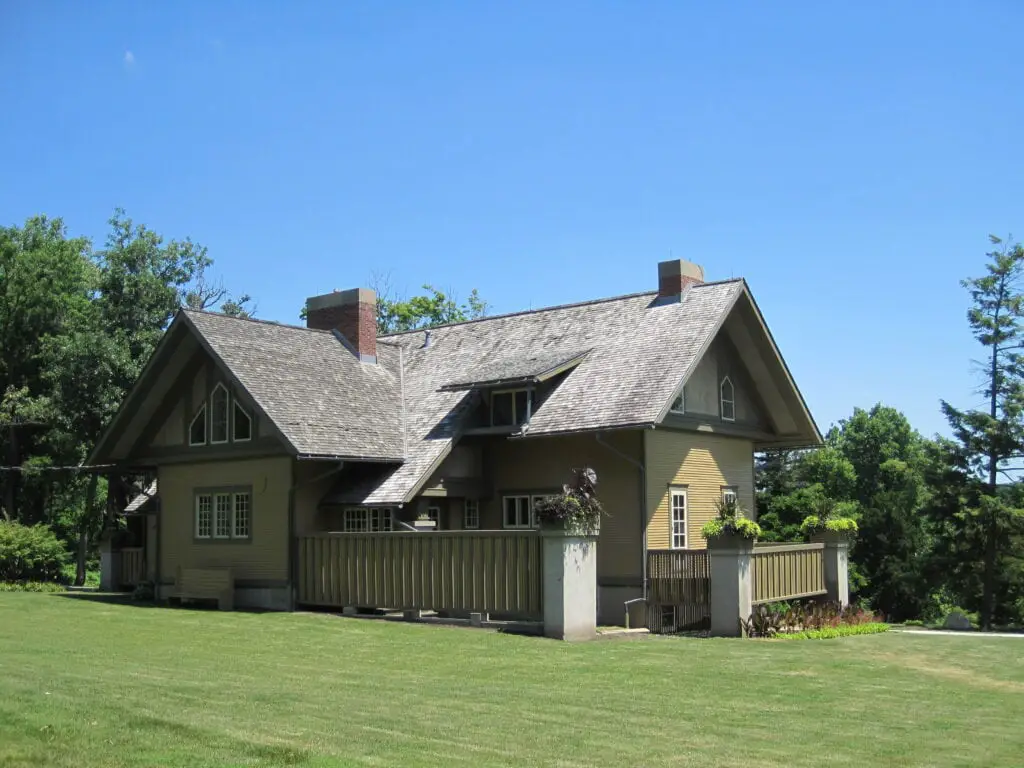
Cultural Influence:
The Fox River and railroads shaped the city and saw a large influx of Swedish immigrants in the late 19th century. This cultural heritage is celebrated every June during the midsummer Geneva Swedish Days.
Interesting Facts:
- Geneva has been the backdrop for films, including the movie "Road to Perdition," filmed there.
- The Geneva History Museum opened in 2004, offering a glimpse into the city's past and showcasing historical photos and artifacts1.
Expositions and Events:
Downtown Geneva hosts various events throughout the year, including festivals, parades, and markets that reflect the city's vibrant community spirit.
Downtown Geneva is not just a place to shop and dine; it's a living museum that offers a window into the past and celebrates the community's heritage and culture. Enjoy exploring the charming streets and discovering the unique stories that each corner has to tell.
Fox River Trail
The Fox River Trail is a scenic pathway that stretches along the Fox River in Illinois. It offers a blend of natural beauty, history, and recreational opportunities.
The trail exhibits the region's ecological diversity, hosting many birds, trees, and wildlife, including bald eagles, herons, and woodpeckers.
Along the trail, visitors can find small parks perfect for picnics, fishing spots, and areas that offer a glimpse into the local flora and fauna.
History:
The trail follows the historic route of the Aurora, Elgin & Fox River Electric Company (AE&FRE), an interurban railway providing transportation between Aurora and Elgin.
The AE&FRE was closely aligned with the Chicago, Aurora & Elgin Railroad (CA&E), known as the "Roarin' Elgin" or "Great Third Rail," which was a vital commuter system for the Chicago area.
The CA&E began as local streetcar operations serving Elgin and Aurora in 1876 and played a significant role in the region's development.
Interesting Facts:
- The trail is built on the former Chicago, Aurora, and Elgin Railroad line, which adds a historical dimension to the experience.
- Along the trail, many towns and business owners have embraced tourism, offering restaurants, cafes, bike shops, and souvenir shops.
- The trail is not only a favorite for its scenic views but also for its historical significance, as it represents the rebirth of the "light rail transit" movement that the interurbans pioneered.
Events:
The trail is a venue for various community events, including biking and walking marathons, nature walks, and educational tours highlighting the importance of conservation and history.
The Fox River Trail is more than just a path; it's a corridor that connects communities, celebrates the region's history, and provides a sanctuary for both wildlife and people seeking respite in nature. Enjoy your exploration of this picturesque trail!
Island Park
Island Park in Geneva, IL, is a picturesque locale that offers residents and visitors a tranquil setting for recreation and relaxation.
Island Park has been an integral part of the Geneva community for many years, serving as a natural oasis in urban development.
The park is on the Fox River, significantly shaping Geneva's history and culture.
Features:
- The park boasts a tree house playground, a unique feature that provides children with a fun and imaginative play area.
- It also includes a pavilion that is available for rental, making it an ideal spot for picnics, family parties, or business meetings.
- With captivating views of the Fox River, the park offers a serene environment where visitors can enjoy nature's beauty.
Significance:
Island Park is a community hub where people can gather, socialize, and engage in various outdoor activities.
It represents the city's commitment to preserving green spaces and providing recreational areas for the public.
Interesting Facts:
- The park is known for its well-maintained trails, popular among walkers and bikers. The trails are designed to be accessible and offer a pleasant experience for all visitors.
- It features restrooms, water fountains for humans and dogs, and plenty of shade, ensuring comfort for everyone who spends time there.
Island Park reflects Geneva's dedication to fostering community and promoting a healthy lifestyle through outdoor activities. It's a place where memories are made, and the simple joys of life can be appreciated.
Peck Farm Park
Peck Farm Park is a 385-acre natural retreat that serves as a significant green space in Geneva, IL.
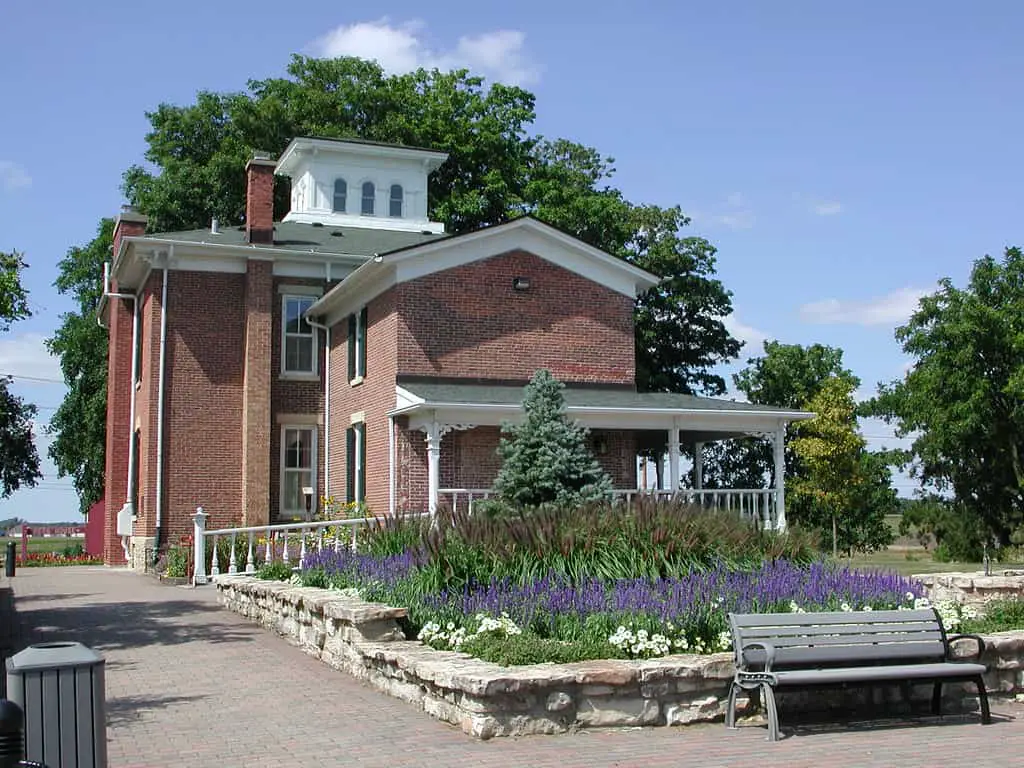
History:
The land, now known as Peck Farm Park, was originally owned by Eli Peck and his family in the 1800s. The Peck clan was skilled at rearing sheep.
In 1991, they passed the baton to the Geneva Park District, which transformed their land into a learning hub. The Geneva Park District dedicated the park as the Peck Farm Park Interpretive Center in 1998.
Features:
History Gallery, Exploration Room, and Gift Shop: The park features a history gallery with interactive exhibits, a 10-minute movie, information on the Peck family, live animals, and nature books.
Butterfly House: Although closed for the 2023 season, the butterfly house typically hosts hundreds of non-native butterflies that fly, feed, and land around visitors.
Hawks Hollow Nature Playground: This environmental educational playground features eight learning stations.
George's Circle: An ADA outdoor amphitheater with a fire pit.
Observation Silo: Offers panoramic views of the surrounding area.
Sensory Gardens: Designed to engage all five senses.
Nature & Bike Trails: Several miles of paved and natural surface trails run through the park.
19-acre wetland: A significant natural feature that supports local wildlife.
Interesting Facts:
- The park includes the historic Peck House, built in the Italianate style with a symmetrical appearance, overhanging eaves, arched lintels, and a central dome.
- The Peck property was once a sprawling farmstead with a flock of 1,800 sheep. After the decline in wool prices post-World War I, it transitioned to cattle, corn, and soybeans.
Events:
Peck Farm Park hosts the 100-Mile Hiking Club, encouraging visitors to log their hiking miles and promoting outdoor activity.
Peck Farm Park is a testament to the region's agricultural heritage, environmental education, and conservation commitment. It's a place where history, nature, and community come together to offer a unique experience for all ages.
Geneva History Museum
The Geneva History Museum is a non-profit institution dedicated to preserving and sharing the rich history of Geneva.
The museum is in the heart of downtown Geneva. It offers a permanent exhibition titled "Geneva's Story," which delves into the city's past.
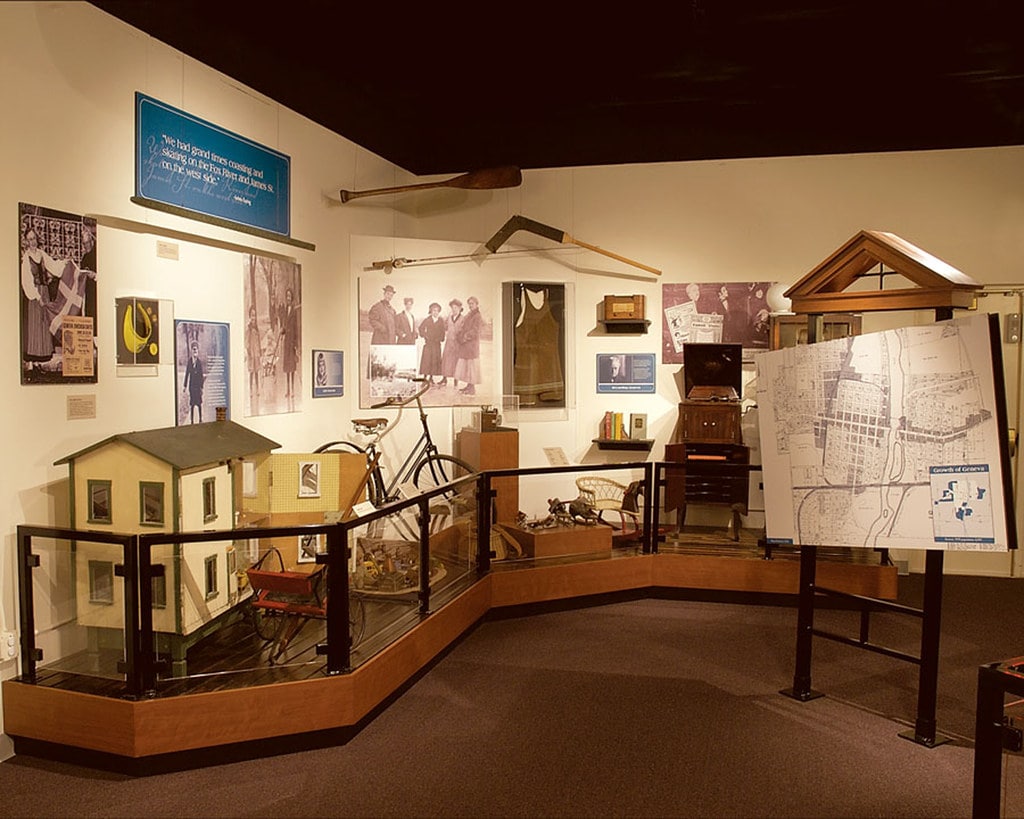
Expositions:
- The museum features a 3,000 sq ft Main Gallery and a 950 sq ft feature gallery that changes yearly.
- It also offers a Children's Gallery with exhibitions each summer.
Interesting Facts & Events:
- The museum collaborates with Preservation Partners of the Fox Valley to highlight the preservation efforts of historical sites.
- Upcoming events include a presentation on the history of South Third Street and a talk on Elizebeth Smith Friedman, a pioneer in code-breaking.
The Geneva History Museum serves as a cultural hub, offering insights into the local heritage and engaging the community with various programs and exhibits.
Durant House Museum
The Durant House Museum is a historical gem in the LeRoy Oakes Forest Preserve in St. Charles, Illinois.
Built in 1843, the Durant House is a brick farmstead constructed in a simple Greek Revival style. It has been authentically restored and furnished to reflect the lifestyle and furnishings of the 1840s.
Expositions:
- Preservation Partners of the Fox Valley operate the museum and is open on select Sundays for visitors.
- It offers hands-on experiences of life on the prairie, led by adult and junior docents in period dress.
Interesting Facts & Events:
The museum hosts various events throughout the year, including an old-fashioned Games Day, Civil War Soldier Encampment, Tool & Textile Day, Pickle Palooza, Bread & Butter Sunday, Heirloom Apple Fest, and the popular Candlelight at Durant-Peterson House.
With activities like wool carding, spinning, weaving, and old-timey pickling, these events glimpse the past.
The Durant House Museum offers a unique opportunity to step back in time and experience the pioneer lifestyle through interactive and engaging activities.
Good Templar Park
Good Templar Park, located in Geneva, Illinois, has a rich history that dates back to 1925 when it was purchased by Good Templars, who immigrated to Chicago from Sweden.
The park was established to celebrate Swedish Day. This holiday coincides with Midsummer in Sweden, which is without alcohol, symbolizing the temperance movement in the United States.
The International Organization of Good Templars (IOGT), which led the temperance movement, was founded in 1851 in Utica, New York, and significantly impacted Scandinavian countries.
When Scandinavian Templars moved to the U.S., they set up lodges to maintain their cultural traditions, including celebrating Midsummer.
The park's Swedish Day festival began in 1911. It grew in popularity, leading to the purchase of land for Good Templar Park. The first Swedish Day celebrated at the park in 1925 attracted 14,000 attendees.
Over the years, the park transitioned from a campground with large tents to family-owned platforms and eventually to more permanent structures called "stugas" (Swedish for little houses) around 1933.
Today, Good Templar Park is a testament to Swedish heritage. Visitors can enjoy nature and recreational activities.
It holds historic cottage walks, where visitors can tour quaint Swedish cottages built during the late 1920s and 1930s and learn about the park's fascinating history.
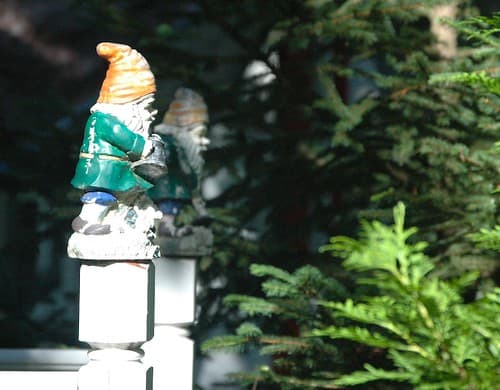
Fox River Trolley Museum
The Fox River Trolley Museum in South Elgin, Illinois (9 miles from Geneva) offers a fascinating journey into transportation history, particularly focusing on electric trolleys and interurban railways.
Historical Background:
The museum's origins trace back to 1961 when it was incorporated as the Railway Equipment Leasing and Investment Co. (R.E.L.I.C.).
It officially opened in 1966 and adopted the name Fox River Trolley Museum in 1984.
Significant Developments:
The museum celebrates the Fox River Line, which dates back to 1896 as part of the Elgin, Aurora, and Southern Traction Company.
1906, it became part of the high-speed interurban, the Aurora, Elgin, and Chicago Railroad.
After financial struggles and reorganization, the Aurora, Elgin, and Fox River Electric Company (AE&FRE) emerged in the 1920s, modernizing its operations and surviving until the mid-20th century.
Expositions and Collections:
- Imagine a time capsule on tracks - that's what the museum offers with its assembly of 30 vintage electric trolleys, railroad wagons, and engines from 1887 to 1959.
- Highlights include the Chicago Aurora and Elgin Railroad car #20 from 1902, the oldest electric interurban car operating in the U.S., and AE&FRE #304, which ran between Elgin and Aurora until 1935.
Interesting Facts:
- AE&FRE #5, a 45-ton General Electric diesel, was the last locomotive to work on AE&FRV tracks, hauling coal cars until 1972.
- The museum's collection reflects the evolution of railway and electric transit lines in the Chicago area, preserving the legacy of a bygone era of transportation.
The Fox River Trolley Museum showcases technological advancements in transportation. It reminds visitors of the railways' pivotal role in the region's development.
It's a place where history enthusiasts can immerse themselves in the nostalgic charm of trolley rides and explore the intricate network of interurban railways that once connected communities along the Fox River.
Cantigny Park
Cantigny Park is a 500-acre park in Wheaton, Illinois (11 miles from Geneva), known for its beautiful gardens and historical exhibits.
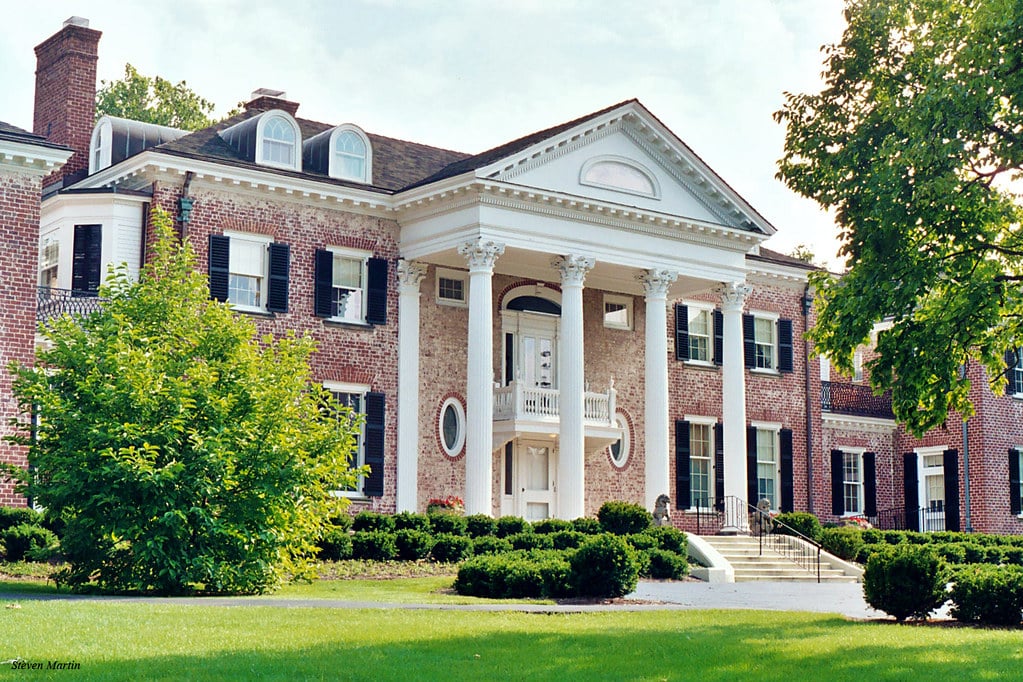
History:
The park was the former estate of Joseph Medill and his grandson, Colonel Robert R. McCormick, publishers of the Chicago Tribune.
McCormick served in World War I and named the estate Cantigny after the Battle of Cantigny in northern France, where he commanded an artillery battalion in 1918.
Upon his death in 1955, McCormick's will established the McCormick Charitable Trust and designated Cantigny as a public space for education and recreation.
Expositions:
- The First Division Museum honors the legacy of the "Big Red One" - the storied 1st Infantry Division of the U.S. Army, a name synonymous with valor and history.
- The museum's exhibits are interactive and provide insights about America's military history, past and present.
Interesting Facts:
- Cantigny Park opened to the public in 1958.
- The park is home to nearly 30 acres of display gardens, created in 1967 by renowned landscape architect Franz Lipp.
- It features a Visitor Center, an Education Center, and Cantigny Golf, a 27-hole golf course.
Events:
Cantigny Park hosts numerous special events, concerts, weddings, garden tours, lectures, horticulture workshops, fitness classes, and more throughout the year.
Cantigny Park is a place to enjoy nature and a venue that offers a glimpse into the history and legacy of a prominent family and America's military past.
It's a destination that enriches the community and provides lasting memories for its visitors. If you're planning a visit to Geneva, Illinois, and are interested in parks of historical significance, Cantigny Park is certainly a noteworthy destination.
Festivals in Geneva
Geneva, IL, hosts various festivals annually, offering unique experiences and celebrations. Here are some highlights:
- Geneva Restaurant Week is a week-long event from January 20 to 28, 2024 that showcases culinary excellence and offers discounted dining at the city's finest restaurants.
- Wine, Cheese & Trees: This fundraiser, which will be held on February 24, 2024, will feature wine, craft beer, appetizers, live music, and auctions to support parkway tree planting in Geneva1.
- Geneva French Market: Starting April 14, 2024, this European-style market offers unique eats, treats, and treasures every Sunday at the Metra parking lot.
- Earth Day Celebration: On April 20, 2024, enjoy recycling opportunities, nature crafts, and more at Peck Farm Park.
- Swedish Days Festival: From June 19 to 23, 2024, celebrate Geneva's Swedish heritage with music, a craft beer tent, carnival rides, and a parade.
- Classic Car Shows: Every Thursday in July & August 2024, vintage cars are showcased at the Kane County Courthouse with 1950s music.
- Geneva Arts Fair: From July 27 to 28, 2024, downtown Geneva will transform into an outdoor gallery featuring artists nationwide.
- Concours d'Elegance: On August 25, 2024, admire a wide array of antique, classic, and modern automobiles in downtown Geneva.
- Festival Of The Vine: From Sept. 6-8, 2024, sample delicious offerings at the Flavor Fare tent, paired with wine and live music.
- Downtown Trick-Or-Treating: On October 24, 2024, children can trick-or-treat in downtown Geneva in their Halloween costumes.
These festivals reflect Geneva's vibrant community spirit and diverse cultural heritage. For more details on these events, visit the official Geneva website or the Geneva Chamber of Commerce website.
